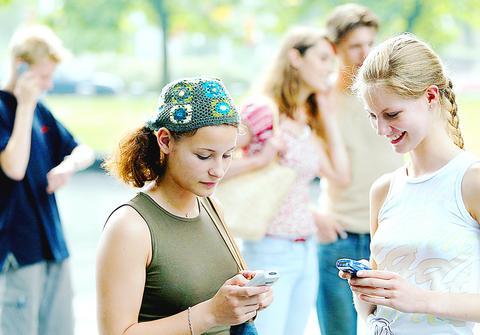Emma would be just another Spanish teenager, if it were not for her mobile phones. She has nine of them, and develops a severe anxiety if she has to enter a place where they have no coverage.
She has forsaken her friends for the sake of unknown chat partners to whom she sometimes sends more than 200 messages in one night. Her mother says she has not slept sufficiently for three years, runs up huge phone bills and has become irritable and prone to lying.

PHOTO: DPA
Psychiatrists say cellphone addiction is an obsessive-compulsive disorder which looks set to become one of the biggest non-drug addictions in the 21st century.
Cellphone addiction can totally isolate its victims, ruin them economically and even turn them into criminals. In Spain, a country of 41 million people which has nearly 35 million cellphones, users are estimated to spend more than 500 million euros (US$590 million) on unnecessary cellphone costs annually.
The majority of the addicts are teenagers, whose shyness and low self-esteem make them succumb to aggressive publicity marketing a means to get in touch with people without having to meet them.
"I liked to chat on the mobile phone, because the chat partners told me nice things that I did not hear in real life, as I am a bit fat," one female former addict told the daily El Pais.
"Mobile phones give young people prestige," Barcelona psychologist Andres Gonzalez explains. "The person who gets the most messages is the most valued."
Many Spanish teenagers get their first cellphone at age 13. Young addicts may spend so much time making calls, receiving messages and logging into the Internet that they fail at school and drop out.
Addicts can easily run up phone bills of 800 euros a month, and some turn to crime to pay them.
One Spanish psychologists' association, for instance, has received hundreds of queries about mobile phone addictions, the daily La Vanguardia reported.
Gonzalez estimates that up to 15 percent of Spanish teenagers sleep with their mobile phones at hand to be able to answer messages at night.
Addiction should be suspected if a person feels an irresistible need to use the cellphone for more than half an hour daily.
Cellphone addiction is not that different from any other type of addiction, ranging from drugs to compulsive shopping, according to El Pais.
A person's vulnerability to addictions "depends largely on a small number of genes", addiction specialist Carlos Alvarez-Vara said. "If a parent is obsessive-compulsive, the children have a 30 percent chance of developing similar characteristics."
The modern addictions to mobile phones and the Internet are, however, paradoxical in that their victims use communication technologies to become isolated.
In societies where family ties have loosened and urban solitude has increased, people become addicted to "long-distance communication because they no longer find human relations through traditional means," psychologist Jaume Almenara said.
Adolescents get access to technologies, but little advice about how to use them, Gonzalez said.
Spanish specialists treat mobile phone addictions with three-month therapies. Experts stress that addictions can sometimes be pre-empted, if parents or teachers spot them early.

On April 26, The Lancet published a letter from two doctors at Taichung-based China Medical University Hospital (CMUH) warning that “Taiwan’s Health Care System is on the Brink of Collapse.” The authors said that “Years of policy inaction and mismanagement of resources have led to the National Health Insurance system operating under unsustainable conditions.” The pushback was immediate. Errors in the paper were quickly identified and publicized, to discredit the authors (the hospital apologized). CNA reported that CMUH said the letter described Taiwan in 2021 as having 62 nurses per 10,000 people, when the correct number was 78 nurses per 10,000

As we live longer, our risk of cognitive impairment is increasing. How can we delay the onset of symptoms? Do we have to give up every indulgence or can small changes make a difference? We asked neurologists for tips on how to keep our brains healthy for life. TAKE CARE OF YOUR HEALTH “All of the sensible things that apply to bodily health apply to brain health,” says Suzanne O’Sullivan, a consultant in neurology at the National Hospital for Neurology and Neurosurgery in London, and the author of The Age of Diagnosis. “When you’re 20, you can get away with absolute

May 5 to May 11 What started out as friction between Taiwanese students at Taichung First High School and a Japanese head cook escalated dramatically over the first two weeks of May 1927. It began on April 30 when the cook’s wife knew that lotus starch used in that night’s dinner had rat feces in it, but failed to inform staff until the meal was already prepared. The students believed that her silence was intentional, and filed a complaint. The school’s Japanese administrators sided with the cook’s family, dismissing the students as troublemakers and clamping down on their freedoms — with

As Donald Trump’s executive order in March led to the shuttering of Voice of America (VOA) — the global broadcaster whose roots date back to the fight against Nazi propaganda — he quickly attracted support from figures not used to aligning themselves with any US administration. Trump had ordered the US Agency for Global Media, the federal agency that funds VOA and other groups promoting independent journalism overseas, to be “eliminated to the maximum extent consistent with applicable law.” The decision suddenly halted programming in 49 languages to more than 425 million people. In Moscow, Margarita Simonyan, the hardline editor-in-chief of the